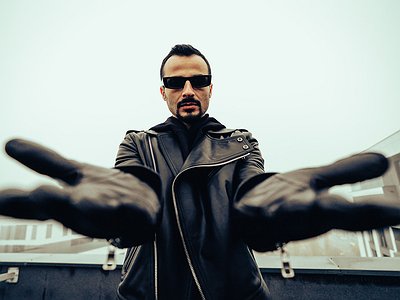Name: Alexandru Cotoi aka Sickotoy
Nationality: Romanian
Occupation: Producer, songwriter
Current release: Sickotoy's new single “Bass Bass” is out via Global. In this interview, we also talk about two other productions with him: "Bad Girl," featuring Inna, Eva Timush, and Antonia, as well as "Said and Done."
If you enjoyed this Sickotoy interview and would like to stay up to date with his music, visit him on Instagram, and Facebook.
I would say that you're a songwriter first, then a producer. Is that how you see yourself as well?
I'm definitely not like a beat maker, that's for sure. When it comes to the songwriting part, I do tend to write some melodies. And I also like to have the vision for the for how the melodies should sound and I can guide the songwriters - those that are in the session with me - in the direction which is the best for the song.
So this is a thing I had, probably since forever - a taste for what works, what's a hit and what's not. Which is a good thing for a producer - probably the most important thing!
I saw a few Instagram pictures of you with a guitar. And in the background, there was a traditional keyboard. Which led me to the conclusion that many of your pieces actually come about very simply by playing them on one of these instruments.
That's actually true, certainly for most of the songs which went on to become hits. And also, this is my process of doing things.
View this post on Instagram
I believe that starting with an acoustic version, a very simplified rendition of the song, and focusing on the melodies, whether it's with a guitar, piano, or some other simple element, allows you to develop the entire song. However, this approach may not work for songs that don't have melodies; I'm not referring to songs with beats or other styles, but specifically those with melodies.
I don't think a beat can work without a hook. But if you have the right hook, even the most minimal beat can work.
One track which must have been important for you is the one you wrote for Pitbull, “Baddest Girl in Town”. How did that connection happen?
That's actually a funny story. I tried to compress it as much as possible. So, more about Mohombi Moupondo, had had a song with Pitbull. I think it was called 'Suave.' He came to Romania to shoot a movie but the whole gig went downhill. As a result, he was stuck in Romania for two days, and we decided to spend some time hanging out. Afterward, he said, 'I want to go into a studio and do some work.'
So, I went with him to the studio, and we recorded a demo. After a month, he flew back to Sweden. I think, he now lives in Africa, but back then, he lived in Sweden. People contacted him for songs for the next Pitbull album, and he sent around 20 Swedish tracks that he had done, along with the one he did in Romania. People picked that one, and it became a single. The rest is history.
The thing is, you never know when an opportunity might appear in your life, you know? We sent the demo, he recorded the tracks, sent them back to me, and I finished the whole production. It was really fast — in just two months, the song was already done. Maybe nowadays, things can go even faster.
Do you write the song with or without having someone specific in mind?
From my experience, when you're trying to do something specific for someone, it usually doesn't work. Although they will initially tell you they are looking for a specific song, it often turns out they were actually looking for something else.
Do you have to wait for inspiration or does it come to you every day?
I don't really believe in that thing to of waiting for inspiration, especially nowadays. I mean, the inspiration starts to come when you actually start doing things.
What is usually for you the point of departure for a song?
The point of departure is the main hook. If I find a cool sample, or I'm doing a thing with the guitar that feels like this could be the main hook of the song. Then I try to find the chorus or the drop or something that I know will stick out.
Usually, the point of departure shouldn't take more than 20-25 minutes.
Tell me about your two recent singles, “Said and Done” and “Bad Girl,” please.
I worked on “Said and Done” in Norway, in Oslo to be precise. I had some sessions there, and that song came up. I was written with Iselin Solheim and Emilie Adams and I really loved it from the start. It has a strong melody to it. The drop isn't as strong, but the chorus and hook melodies are very, very cool.
As for 'Bad Girls,' it was actually a song written in Dubai during a writing camp organized by Global Records. It was the second song of the day in a session, so we probably worked on the first one, which was more beat-oriented, for four or five hours. Then we just had fun for, I don't know, 30 minutes, and 'Bad Girls' came out. Good ideas don't always require too much work.
That's reassuring to know because I think the the general perception is that tracks like this are often written according to a strict formula.
You may apply a formula when you need a specific song or if you're given a specific brief, and you start thinking about it very structurally. You can create good songs that way. However, the special ones are often the ones that don't follow that approach.
Sickotoy Interview Image (c) the artist
Do you enjoy the team songwriting process and process more than the the one where you actually are not in control all by yourself?
Oh, yeah, definitely. I mean, it's stimulating to work in a team, and it's also great that you need to listen to everyone's opinions and ideas. Because an idea, a word, or something else can inspire you to do something different or apply changes to a song. Whereas, if you have a preconceived notion of how the song should be, it usually doesn't work.
We're creative people, and we need to inspire one another.
Where you're writing as a team, does it still feel like it's your own song?
Definitely. And usually, the people I work with don't have any egos going into the session. We are there to serve the song, not to serve someone in the session. So we leave all of our egos aside. And we just try to make the song as good as possible
Do you usually arrive with something already prepared?
Some producers usually have something prepared, but not me. I usually start from scratch. This allows you to take the song wherever you want or need to take it.
You can change the tempo, you can change the feel, you can start another idea in 15 minutes, if you feel that you're stuck.
Do you have five people or so in the room at all time?
Usually, we're two-three, maximum four people. And we don't split into smaller groups. We just work on the same song together. But I'll usually be the producer while someone else is better at writing lyrics. Someone else yet is better with the melodies. So you just divide the work in sensible ways. It's like a lab.
Usually a publisher organises a writing camp where they bring together different producers, and different songwriters from around the world. We just go there for two weeks, write songs, have some fun, relax, chill. Good times.
Overall, there could be from 20 to 40 people at a camp. The biggest camp was around 50 people. And all of them have lots of songs. In total, you'll have 9-10 working days to refine them. Usually a camp like that generates around 90-100 songs. Or at least ideas.
If you're working with certain vocalists, will you often get to meet them? Someone like Tove Lo, for example?
I worked with Tove Lo as part of a song I wrote for Alok, “Don't Say Goodbye.”
Tove got involved after we had already created the song. The original singer was Hannah Wilson, who is the main songwriter also, and I think it was also pitched to Becky Hill. So Becky Hill might have a version of that song as well.
This is where management comes into play in the industry. We pitch the song to the artist's management, and if the artist likes it, they may consider featuring on it. Afterwards, we work closely together to refine the song. We also provide input on how it should be presented. This is how it comes to life.
But I didn't actually get to meet Tove as part of this project. Tove, however, made some changes to the lyrics from the original demo. It's interesting to have the original session and see how the initial idea evolves into its final form. Yeah, it's always fascinating to see how it ends up on Spotify.
You said before that you have a pretty good idea of what makes a song good and what potentially makes it a hit. What, on the most basic level, is that?
That's probably one of the biggest questions, and here's one of the industry's best-kept secrets … well, it's not really a secret.
The first part is that you really need to love listening to music, even from a young age, like during your teenage years. You must have a genuine love for music. Personally, I was always drawn to songs like that. I loved Metallica, Nirvana, AC/DC, and The Prodigy, among others. Even though I listened to their entire albums, I often found myself enjoying the hits the most. This experience trained my ear to recognize what qualities make a song a hit.
So, my advice would be to listen to songs that are hits and think about what makes them stand out. Is it the way the melody sticks in your head? The fact that they don't have overly complicated structures? Is it the beat that gets you moving?
Even when you're in a car listening to the radio or a Spotify playlist, your brain has to be functioning like a producer. You listen to a playlist, and one of the songs catches your attention. You start wondering why you love that song and then check out the numbers, realizing that the song you love has 100 million streams. It all starts to make sense.
You've said you end up with up to 100 songs from a writing camp. Quite a few of those will never be recorded. Are there many really good songs which never get to the final stage?
For sure. But you never know like, next year or the year after, someone may say: Maybe David Guetta might want it.
Ian Kirkpatrick once said in an interview that he had written a song for Dua Lipa two years before she decided to actually record it. It turned into one of the biggest hits in the world. There are lots of sleepers in the music industry.





